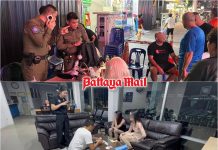
This week the powerful Centre for Covid-19 Situation Administration (CCSU) has updated the groups of foreigners able to apply to board a plane to Thailand. Mostly they are categories who have business or work-related documentation or are thought to be affluent, such as those holding a Thailand Elite privilege card.
There are a few eligible groups which can be broadly described as humanitarian gestures, including foreigners with Thai spouses and/or family financial responsibilities and those classed as “residents”, a much misunderstood term which refers exclusively to those who have no end date in their passport when they must leave the country or renew.
A slightly odd grouping refers to medical tourists, usually thought to be magnificent contributors to the Thai treasury. However, the websites of Thai embassies abroad (including the UK) are stating that, to be eligible, you must have a letter from a hospital in your home country stating that you have a life-threatening disease that cannot be treated there. Very odd rule when you think about it.
All these groups can board a plane only when their Thai embassy issues a certificate of entry which requires voluminous paperwork, expensive insurance and 14 days quarantine on arrival at your own expense. The Thai foreign affairs ministry is also stressing that entry approvals will be handled on a case by case basis. Almost all the permitted groups will require a non-immigrant visa.
Meanwhile, Thai border posts remain closed for most human traffic, although labourers from neighboring countries who have registered online are trickling back to jobs in the construction, fishing and retail industries. New arrivals are subject to virus testing and quarantine facilities. Legal workers from Myanmar, Cambodia and Laos are governed by the multi-governmental Memorandum of Understanding (MOU), although non-registered or illegal workers are by no means unknown.
In other words, foreigners who want to vacation in Thailand are excluded from the eligible groupings and likely to remain so as the government aims for continued zero community infections. All talk of travel bubbles, for example, appears to have been dropped as second-wave infections cause panic in countries such as Vietnam, China and Australia which were being considered as partner just weeks ago. Thai embassies abroad specifically state that they will not issue visas or certificates of entry for tourism or retirement.
There has been substantial publicity about the plight of mainly European expats with one year retirement visas or extensions of stay who are marooned abroad but want to return to Thailand. We now know for sure that retirees are considered as tourists in this context, unless perhaps they can separately prove a live marriage to a Thai national. Retirees sometimes believe they are Thai residents because they have bought property or believe the Land of Smiles is their home. On the other hand, retirees are seen by the authorities as one-year-at-a-time tourists. Although they are formally required to show an income or have a Thai bank balance of at least 800,000 baht to qualify, the regulation is sometimes circumvented by third party intervention by generous friends or agents.
The reality is that 90 percent of the foreigners who visited Thailand in 2019 would be banned by the CCSU regulations now in force. Whilst the scenario can change at short notice – a vaccine appears or the virus goes into remission worldwide or government policy changes – it’s demonstrably untrue that Thailand is slowly getting back to normal. And you can’t predict the future because, alas, it hasn’t happened yet.
 |
 |
 |





